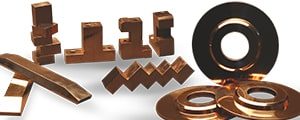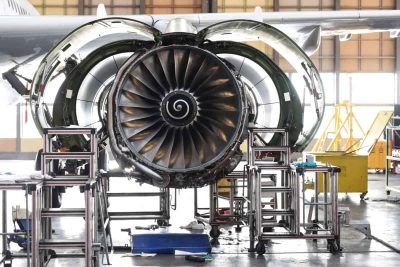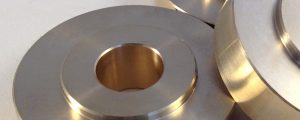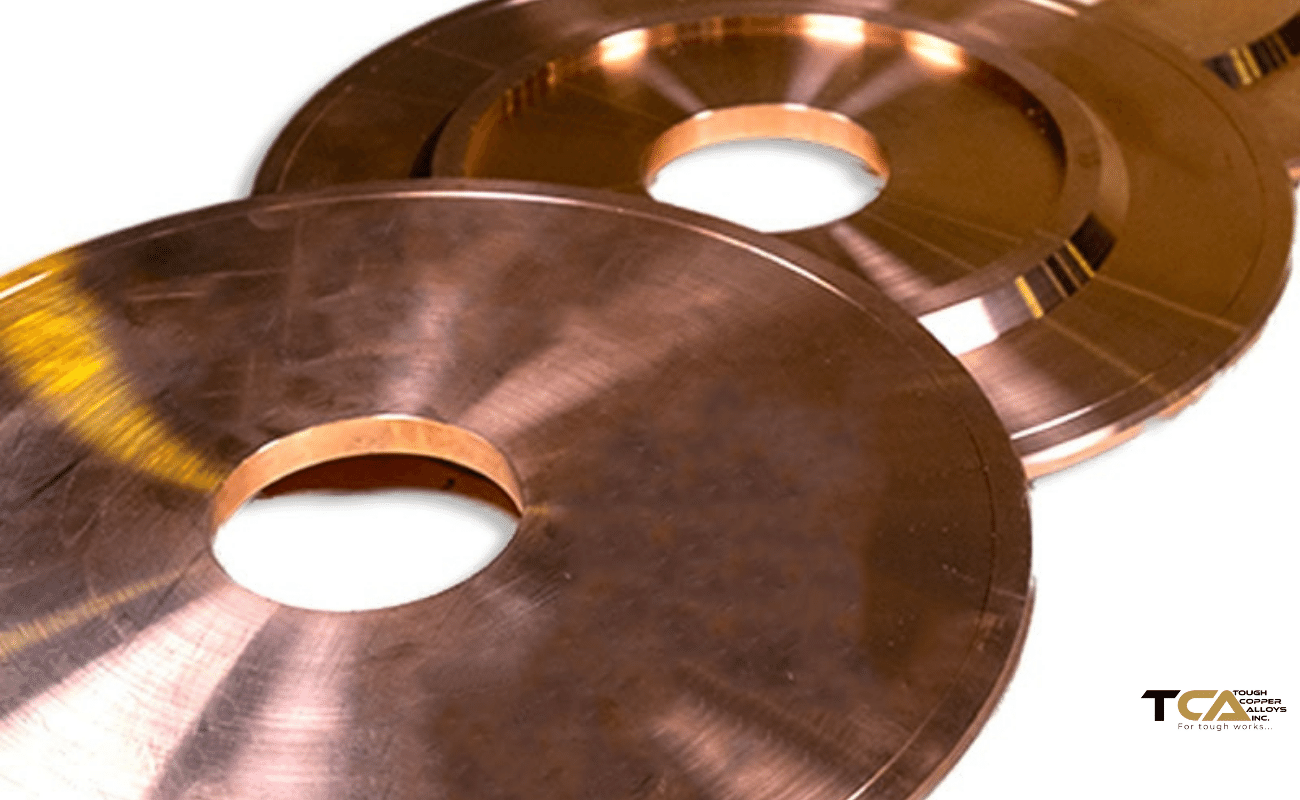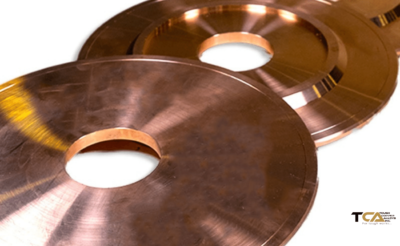What is “C18200” Material?
C18200 is a high-conductivity chromium copper alloy that is widely used in electrical and electronic applications. It is also known as Chromium Copper or C182 Copper. The alloy is a combination of copper and chromium, with copper making up approximately 99.1% of the material and chromium accounting for the remaining 0.9%.
One of the key advantages of C18200 is its excellent thermal conductivity, which makes it an ideal choice for applications that require efficient heat dissipation. The alloy also offers good corrosion resistance, high strength, and excellent electrical conductivity.
C18200 material is commonly used in a variety of industries, including automotive, aerospace, electrical and electronics, and plumbing. It is used for manufacturing electrical connectors, welding tips, and other components that require high conductivity and strength.
In summary, Cupro C material is a high-conductivity chromium copper alloy that offers excellent thermal conductivity, corrosion resistance, and strength. It is widely used in a variety of industries for manufacturing electrical and electronic components.
Application Areas & Industries of “C18200”
C18200 is a copper chromium material that is highly sought after in a variety of industries. Its unique properties make it ideal for use in applications where high strength, wear resistance, and thermal stability are required. Here are some of the application areas and industries where C18200 is commonly used:
- Electrical and Electronic Industry: C18200 is commonly used in the electrical and electronic industry for a wide range of applications. Its high conductivity, excellent corrosion resistance, and ability to withstand high temperatures make it ideal for use in connectors, terminals, and switches.
- Aerospace Industry: The aerospace industry requires materials that can withstand high-stress environments and extreme temperatures, which is why C18200 is a popular choice. It’s commonly used in components such as heat exchangers, bearings, and fasteners.
- Automotive Industry: The automotive industry relies heavily on materials that are durable and can withstand wear and tear. C18200’s high strength and wear resistance make it ideal for use in components such as valve guides, rocker arms, and bearings.
- Marine Industry: C18200’s excellent resistance to corrosion and biofouling make it an ideal material for use in the marine industry. It’s commonly used in applications such as propeller shafts, seawater pumps, and heat exchangers.
- Manufacturing Industry: The manufacturing industry requires materials that are easy to machine and can withstand high temperatures. C18200’s excellent thermal stability and machinability make it a popular choice for use in manufacturing tools, molds, and dies.
In summary, C18200 is a versatile material that is widely used in various industries due to its unique properties. Its high strength, wear resistance, thermal stability, and corrosion resistance make it an excellent choice for a wide range of applications.
Common Fabrication Processes of “C18200”
C18200 is a copper-chromium alloy with excellent conductivity and high temperature strength. Due to its unique properties, it is used in various industries such as aerospace, electrical, and automotive. To achieve the desired shape and dimensions, Cupro C can be fabricated using a range of processes, including:
- Machining: Machining is a common fabrication process for C18200. It involves cutting, drilling, and shaping the alloy using various machine tools such as lathes, milling machines, and grinders.
- Forming: Cupro C can be formed into different shapes through processes such as bending, stamping, and rolling. This process can be done at room temperature or at elevated temperatures to achieve the desired shape.
- Welding: C18200 can be welded using various methods such as gas tungsten arc welding (GTAW), gas metal arc welding (GMAW), and resistance welding. Welding can be used to join Cupro C to other materials or to repair damaged parts.
- Heat treatment: Heat treatment can improve the strength and hardness of C18200. The process involves heating the alloy to a specific temperature and then cooling it at a controlled rate to achieve the desired properties.
- Plating: C18200 can be plated with other materials such as nickel or tin to improve its corrosion resistance or to achieve specific surface properties.
Overall, the versatility of Cupro C and the variety of fabrication processes available make it a popular choice in many industries.
Chemical Composition of Cupro C
C18200, also known as chromium copper, is a high copper alloy with a small addition of chromium. The chemical composition of C18200 is typically 96.1% copper (Cu) and 1.8% to 2.4% chromium (Cr), with the remaining balance made up of trace elements. The addition of chromium to copper improves the material’s strength, hardness, and resistance to corrosion and wear.
C18200 is also known for its excellent thermal and electrical conductivity, making it a popular choice for a variety of applications where conductivity is critical. It is commonly used in electrical components, connectors, and high-performance switchgear, as well as in aerospace, automotive, and marine industries.
Overall, the chemical composition of C18200 makes it a reliable and high-performance material that is well-suited for many different applications.
| Elements | |||||
|---|---|---|---|---|---|
| Cu(1,2) | Pb | Fe | Cr | Si | |
| (1) Cu + Sum of Named Elements 99.5% min. (2) Cu value includes Ag. |
|||||
| Min (%) | 0.6 | ||||
| Max (%) | Rem | 0.05 | 0.10 | 1.2 | 0.10 |
Physical Properties of “C18200”
C18200 is a copper alloy known for its exceptional strength, conductivity, and durability. Its physical properties make it ideal for use in a wide range of applications, including electrical components, connectors, and switches.
The density of Cupro C is 8.83 g/cm³, and its melting point is 1030°C. It has a high thermal conductivity of 338 W/mK, which allows for efficient heat transfer in high-temperature applications.
C18200 also exhibits excellent corrosion resistance, making it suitable for use in harsh environments. Its tensile strength is 585 MPa, and its elongation is 5%. These properties allow C18200 to withstand high stress and deformation without breaking or cracking.
In addition to its physical properties, Cupro C is also easy to work with using common fabrication techniques such as machining, forging, and welding. This makes it a popular choice for manufacturers who require a material that is both versatile and reliable.
Overall, Cupro C is a copper alloy with outstanding physical properties that make it well-suited for a variety of industrial and commercial applications.
Fabrication Properties
C18200, short for Chromium Copper, is a copper alloy that exhibits excellent fabrication properties. Some of the notable fabrication properties of C18200 include:
- High Formability: Cupro C has high formability, which allows it to be shaped and formed into different shapes and sizes through processes like forging, stamping, drawing, and bending.
- High Weldability: C18200 has high weldability, making it easy to join different parts of a structure together, resulting in a strong and durable final product through processes like TIG, MIG, and resistance welding.
- High Solderability: Cupro Chas high solderability, making it an ideal choice for use in electronic devices as it can be easily soldered to other metals, creating a strong and conductive bond.
- High Machinability: C18200 has high machinability, which makes it easy to cut and shape through processes like turning, drilling, and milling.
- High Brazability: Cupro C has high brazability, making it easy to join different parts of a structure through brazing.
In conclusion, C18200 is a copper alloy that exhibits excellent fabrication properties such as high formability, weldability, solderability, machinability, and brazability. These properties make C18200 an ideal choice for various applications in electronic devices, electrical equipment, scientific instruments, as well as in construction, transportation, and many other industries.
Applicable Specification of Cupro C
C18200 is a copper alloy that is used in a variety of applications across different industries. To ensure that Cupro C meets the specific needs of each application, it is manufactured to conform to various industry standards and specifications. Some of the most commonly used specifications for C18200 include:
- ASTM B196: This specification covers high-conductivity copper alloys in the form of wire, rod, bar, plate, and strip.
- ASTM B224: This specification covers round copper wire for electrical purposes.
- ASTM B570: This specification covers the requirements for copper beryllium alloy UNS C17200 strip and sheet.
- AMS 4535: This specification covers a copper-beryllium alloy in the form of bars, rods, and forgings.
- MIL-C-81021: This specification covers copper-beryllium alloy strip, sheet, and plate.
- QQ-C-533: This specification covers copper-beryllium alloy strip and sheet.
- SAE J461: This specification covers copper and copper alloys, including C18200, in the form of bars, rods, and shapes for use in screw machines and other similar applications.
- SAE J463: This specification covers copper and copper alloys, including C18200, in the form of bars, rods, and shapes.
By conforming to these specifications, Cupro C can meet the required standards for different applications, ensuring that the final product performs optimally in terms of mechanical, electrical, and chemical properties.
Thermal Properties
C18200, also known as chromium copper, is a copper alloy that is widely used in applications requiring high thermal conductivity. The thermal properties of C18200 make it an ideal choice for applications where heat dissipation is critical. Some of the key thermal properties of C18200 include:
- Thermal Conductivity: C18200 has a high thermal conductivity of approximately 390 W/mK, which allows it to efficiently transfer heat and dissipate it away from sensitive components.
- Coefficient of Thermal Expansion: Cupro C has a moderate coefficient of thermal expansion of 17.6 µm/m°C, which means that it can expand and contract with changes in temperature without losing its shape or structural integrity.
- Melting Point: The melting point of C18200 is approximately 1075°C, which makes it suitable for use in high-temperature applications.
- Specific Heat Capacity: C18200 has a specific heat capacity of 0.385 J/g°C, which means that it can absorb and release heat without significant changes in temperature.
Overall, the thermal properties of C18200 make it a popular choice for a wide range of applications, including electrical and electronic components, heat sinks, and other thermal management solutions. The high thermal conductivity, moderate coefficient of thermal expansion, and high melting point make C18200 an ideal material for use in high-temperature environments where heat dissipation is critical.
Typical Uses of Cupro C
C18200 is a high-performance copper alloy that offers excellent mechanical, thermal, and electrical properties. This versatile material is widely used in a range of industries due to its unique combination of properties. Some of the most common uses of C18200 include:
- Electrical and Electronic Components: C18200’s high electrical conductivity, good thermal conductivity, and excellent resistance to corrosion make it an ideal material for electrical and electronic components such as connectors, switches, and relays.
- Welding Electrodes: C18200 is also used as a material for welding electrodes due to its high strength and resistance to corrosion.
- Resistance Welding Electrodes: Cupro C’s high resistance to wear and deformation makes it a suitable material for resistance welding electrodes.
- Heat Exchangers: The high thermal conductivity and corrosion resistance of C18200 make it a popular choice for heat exchanger applications in various industries.
- Marine Applications: Due to its excellent resistance to corrosion in seawater, C18200 is used in marine applications such as boat and shipbuilding.
- Aerospace Industry: Cupro C is also used in the aerospace industry for applications such as electrical contacts, heat exchangers, and hydraulic system components.
- Automotive Industry: C18200 is used in the automotive industry for applications such as electrical contacts, engine parts, and brake systems.
In conclusion, C18200 is a versatile material with a range of excellent properties, making it suitable for a wide variety of applications in industries such as electronics, welding, marine, aerospace, and automotive.
Equivalents of “C18200”
C18200 is a high copper content alloy that is primarily used for its excellent resistance to softening at elevated temperatures. However, there are some instances where a similar alloy may be needed due to availability or other reasons. Some of the equivalents of Cupro C include:
- C17500: This alloy contains a higher amount of beryllium and is used in applications where high strength and hardness are required.
- C18150: This alloy has a slightly lower copper content than C18200, but higher levels of zirconium and is used in applications requiring high strength and wear resistance.
- C18210: This alloy has a similar copper content to Cupro C but contains a higher level of chromium and is used in applications where high strength and corrosion resistance are needed.
- C18000: This alloy has a lower copper content than C18200 but a higher amount of nickel and iron, giving it improved strength and toughness.
- C17510: This alloy is similar to C17500 but with higher levels of nickel and iron, offering improved strength and conductivity.
When considering the use of an equivalent alloy, it’s essential to ensure that it meets the specific requirements of the application. It’s recommended to consult with a materials engineer or supplier to determine the most suitable alloy for the intended use.
In conclusion, while Cupro C is a widely used alloy, there are several equivalents available with slightly different properties. The selection of an equivalent alloy will depend on the specific requirements of the application, and it’s important to consult with an expert before making a decision.


